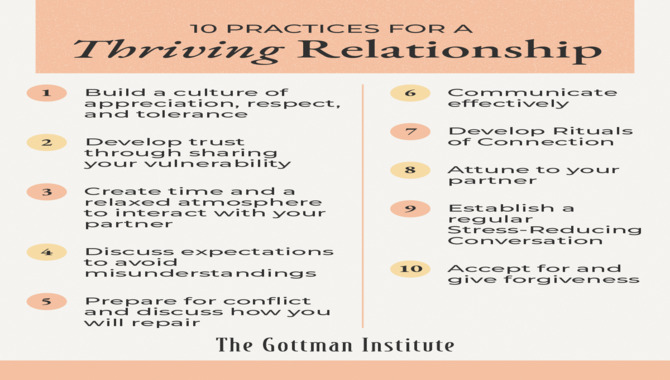The relationship between two people is often one of the most important in their lives. This relationship can greatly impact a couple’s happiness, health, and overall well-being.
It’s Nurturing healthy relationships with friends, family members, romantic partners, and colleagues is crucial. The relationship between two people affects every part of their lives: work, hobbies, and physical well-being. As individuals evolve and change over time, so does the nature of their relationship. Relationships are a beautiful thing.
Humans have evolved to form bonds with others, often forming romantic relationships to find comfort, support, and belonging. When they’re working, healthy relationships can be incredibly rewarding. They allow us to feel loved, cared for, fulfilled, and inspired.
But as with anything, relationships require work and attention and take time to develop properly. Here, we’ll discuss some of the best practices for a thriving relationship. These will help you learn how to build a stronger connection with your partner and become better at communicating with each other.

What To Practice For A Thriving Relationship

The key to a thriving relationship is communication and ensuring that each partner gets their fair share. This involves being open and communicative with your partner, both verbally and nonverbally. It also means being honest and truthful, even when it’s difficult. That will help build trust, which will, in turn, foster a positive partnership.
It’s important to treat your partner with respect, regardless of the situation or argument. Even after being together for a long time, commitment is essential to a healthy relationship. That doesn’t mean you can’t change or adapt, but you should be willing to work hard for the relationship.
Likewise, flexibility is essential in keeping the dynamic of your connection alive and well. That includes being willing to change and adapt as situations evolve, especially if this helps make both of you happier in the long run. Finally, honesty is key to building trust in any relationship. Don’t lie to or withhold information from your partner, as that will only lead to tension and conflict. Likewise, loyalty is essential in strengthening the bond between two people.
1. Communication:

Communication is key to a thriving relationship. Successful communication requires open, honest, and respectful sharing of thoughts, feelings, and ideas. Communication also helps build trust and understanding between partners. It can help resolve conflicts peacefully and efficiently.
In a relationship, effective communication can make it stronger and more fulfilling. Communication is essential in any relationship, but it can be challenging when both people are at different stages in their lives or when there are communication differences between cultures or language backgrounds.
Talking about feelings and sharing your thoughts with your partner helps build trust and intimacy. It also helps you understand each other better. While communication is vital in any relationship, it can be especially important for those with different stages in life or who may face cultural or language barriers.
Whether you’re new to a relationship or struggling to communicate effectively, there are certain practices you can practice to improve your communication skills. These tips can help you and your partner communicate better and have a healthy relationship that lasts long into the future.
2. Honesty:
Honesty is the cornerstone of a thriving relationship. To build a strong relationship, be honest with your partner. Don’t keep secrets or hide information from them. Instead, be willing to apologize when you make a mistake. Trust and communication are key to a successful relationship. So be honest and open with your partner, and you will have a healthy relationship that thrives over time.
3. Vulnerability:
Openness in a relationship can be tricky, but opening up to your partner allows them to see you in a new light and understand you better. Vulnerability in the relationship can help build trust and intimacy. If you want a thriving relationship, it’s important to be honest and upfront with your partner, even if it makes them uncomfortable.
This honesty can help strengthen your relationship over time. Practicing vulnerability in your relationship will allow you to share your feelings and vulnerabilities without fear of being judged or rejected. The more you open up to one another, the closer you become and the stronger your relationship.
4. Growth:

Some best practices for a thriving relationship include communicating and understanding each other’s needs. Both partners should be willing to compromise on occasion, and both should be willing to give and receive love and care. Building trust is also key, as is communicating openly and honestly. Practicing these principles in your relationship can help ensure that it grows and thrives over time.
5. Intimacy:

Intimacy is vital in any thriving relationship, but it can be challenging to achieve. Fortunately, several practices can help build intimacy in your relationship. Some practices include spending time alone together, communicating openly, and caring for each other’s needs. By investing time into building intimacy in your relationship, you learn to trust and care for one another and ultimately strengthen your bond.
The key to a thriving relationship is honesty and open communication, so practice those two things consistently. Whether talking about your day or sharing news about the family, sharing personal information with your partner will show them how much you value their input and help build intimacy over time.
6. Mutual Respect And Appreciation

Mutual respect and appreciation are essential ingredients for a thriving relationship. Respect means having understanding and appreciation for your partner’s strengths and weaknesses. Appreciating your partner means taking the time to notice the good things about them, whether their kindness or sense of humor.
By practicing these 10 practices for a thriving relationship, you can build a stronger relationship with your partner and improve your relationship over time whether you are going through a challenging relationship or looking to strengthen it, practice mutual respect and appreciation to ensure a healthy and happy relationship long into the future.
7. Mutual Support And Understanding

Mutual support and understanding are essential in a healthy relationship, and practicing regularly can help build trust and strengthen the relationship. One way to support and understand each other is to listen attentively. To truly hear each other’s point of view, it is important to be present and attentive during conversations. Additionally, showing your feelings openly and honestly can help strengthen the relationship.
Communicating effectively and respectfully will also help build trust within a relationship. Respect each other’s privacy and personal space by avoiding invading one another’s personal space, such as sitting too close on the couch or leaving one’s belongings lying around. Finally, spending time together regularly can help build intimacy in a relationship.
8. Teamwork And Cooperation

Communication is key to healthy relationships. A vital part of communication is respecting your partner’s autonomy. This means that you should respect your partner’s choices and decisions, even if you disagree with them. Both partners must be willing to compromise and commit to working together towards common goals to create a healthy relationship.
It is also important for both partners to be committed to working together towards common goals. This can include accomplishing tasks as a couple or as a family, collaborating on projects, or supporting each other’s success. Both partners should have mutual understanding and support for each other’s emotional and practical needs. Both partners must also be willing to forgive and forget past mistakes to move forward in the relationship.
9. Flexible Boundaries

A flexible boundary is a healthy balance between intimacy and independence in a relationship. It helps to minimize conflict and promote understanding by allowing for some space, autonomy, or privacy while maintaining the relationship.
It is important to communicate openly and honestly with your partner regardless of how disagreements may initially appear. By creating a timeline for important milestones, such as holidays and birthdays, both parties can stay on track.
This allows both parties to feel respected and in control of the relationship. Creating a flexible boundary allows both individuals to grow and enjoy the relationship while ensuring that both can maintain their individuality and identity.
10. Appreciation For The Other Person’s Unique Qualities

Appreciation is key to a thriving relationship. Each person in the relationship has unique qualities that deserve to be cherished. When you appreciate your partner, they will feel appreciated and fulfilled.
Taking time to talk about what is happening in your relationship and expressing your feelings openly and honestly are all important practices for appreciating one another. Expressing affection and showing appreciation for one another can help strengthen your relationship over time.
To truly appreciate your partner, it is vital that you take time to listen and show empathy. Additionally, taking time for fun together is essential to maintaining a healthy relationship. Besides, making sure you celebrate the good moments together will also contribute to strengthening your bond as a couple. If you find your relationship struggling, seek out professional help from a counselor or therapist.
Want To Learn How To Keep A Healthy Relationship?

When it comes to healthy communication, it is important to keep in mind that communication should be supportive, honest, and respectful. Communication should not be destructive, hurtful, or unsupportive in any way.
Some signs that a relationship may be unhealthy are when arguments become frequent, people withdraw from social activities, and there is a general lack of trust. When it comes to communication, both partners should be willing to listen and understand each other’s points of view.
Mutual understanding is essential in any relationship because it allows both parties to share their feelings and know that the other person is truly listening. Finally, compromising goes a long way in any relationship. If one person is willing or unable to compromise, the relationship will most likely only last for a while.
Lastly, putting the needs of the other person before your own is a must in any healthy relationship. This means valuing and cherishing the other person just as much as you value and cherish yourself. If you do this, then your relationship will be healthy and flourishing.
If you feel like your relationship is headed down a path of toxicity, it is important to identify and address any toxic communication. This can be done in several ways, such as setting clear boundaries, sharing your thoughts and feelings openly and honestly, and finding healthy ways to resolve conflict.
By doing so, you can restore healthy communication in your relationship. Keeping a healthy relationship can be a manageable task. There are simple practices you can follow to ensure that your relationship is healthy and fulfilling for both of you.
- Communication is key
- Set boundaries
- Don’t take things for granted
- Give and take
- Take care of yourself.
- Don’t jealousys
- Respect each other’s privacy
Conclusion
In the relationship context, healthy relationships are characterized by communication and emotional closeness, as well as a sense of trust and mutual understanding. When there is healthy communication and emotional closeness, people feel understood, cared for, and valued.
Valuing another person’s perspective and feelings helps promote emotional closeness and an atmosphere of trust. A healthy relationship allows individuals to be themselves, express who they are, and build a connection with their partner.
Frequently Asked Questions:
1.What Are The Best Practices For A Thriving Relationship?
Ans: When it comes to a thriving relationship, making sure you pay attention to your partner’s needs and feelings is key. Committing to communicating openly and honestly is also important, as it allows for clearer communication which can prevent misunderstandings and conflict.
2.What Is The Difference Between Healthy Communication And Toxic Communication?
Ans: Healthy communication is communication that is supportive, honest, and respectful. Toxic communication is communication that is destructive, hurtful, and unsupportive. Some signs that a relationship may be unhealthy are when arguments become frequent, people withdraw from social activities, and there is a general lack of trust.
3.What Is Emotional Intelligence, And Why Is It Important For Couples In A Healthy Relationship?
Ans: Emotional intelligence is the ability to be aware and understand your own emotions and the emotions of others. It can help you manage relationships effectively by allowing you to communicate better, resolve conflicts amicably, and stay connected.
The following practices are associated with a healthy relationship: expressing your feelings, setting boundaries, tolerating differences, understanding each other’s needs, and taking action based on agreements made.
4.What Makes A Thriving Relationship?
Ans: A thriving relationship is characterized by mutual respect, communication, and trust. These three things are key to a healthy relationship, as they allow for healthy communication, compromise, and teamwork. Ordering to have a thriving relationship takes time and effort. Some practices that can help you cultivate these qualities in your relationship include setting boundaries, being honest, and being understanding.
5.What Is The Key To A Healthy Relationship?
Ans: A healthy relationship is built on communication, mutual respect, understanding, and compromise. These are the key ingredients for a healthy relationship. If these things are present, then everything else falls into place. A thriving relationship also involves working together as a team to improve things like communication or conflict resolution skills or simply enjoying each other’s company.
In summary, maintaining a thriving relationship is all about putting the other person first and valuing them for who they are. Here’s what you can practice supporting a thriving relationship. If practiced together, these skills will help you thrive in your relationships – no matter their type.

Leave a Reply